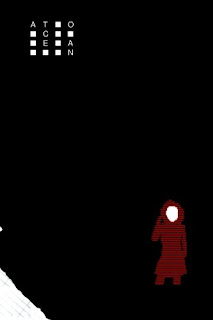At Ocean - Oliver Serang
Again, the story and its underlying human connection appears simple enough on the surface. As the world is bracing itself for the impact of a threatening comet, Eun Kim travels to Zurich to meet with a large multinational corporation. A researcher and professor at a small university of no great renown, Eun is surprised to find that the people at Haylon Labs not only know of her work, but they also know an awful lot more about her personal life. What they have learned is enough for them to offer Eun a unique opportunity to research a project in the Arctic Ocean, where unexplored nutrient beds have only recently become accessible due to the melting of the icecaps. Haylon are willing to pay the young woman a considerable amount of money to take part in the expedition.
For Oliver Serang however, this is only the surface of the story, since the core that underpins it relates to Eun Kim's remembered and dreamed of childhood experiences. Those memories of strange times and troubled encounters with her parents all seem to be related or connect to the experience that she is going through as she travels north to Oslo and then on the Chocolate Classic research ship up into the dangerous waters of the Arctic. The locals believe monsters are a threat, but the reason Eun is assigned a bodyguard for protection is that other agencies are interested in what Haylon are secretly looking for up there. It's not new beds of ocean nutrients or other valuable resources that they have discovered there, but a mysterious object with mathematical properties that could revolutionise science.
That's the story in outline, but even within such a relatively short novel, there is an abundance of ideas that spark off seemingly random connections and other potential paths of interest. Even when looking out of a window, examining the fabric of a protective coat or the steel construction of a boat, Eun's mind wanders off to consider the structure and make-up of every object and surface she touches, sparking off reactions that somehow almost always relate back to her unusual experiences of her childhood by the sea. There is little that obviously connects these moments other than that it stirs up deep feelings in Eun, but every moment and incident seems to hold unlimited potential and bristle with possibilities.
Serang doesn't allow such digressions to take the reader away from the main story. Rather they serve to enrich what on its own terms is a terrific little surreal SF conspiracy thriller. The nature of the writing however is determined to a large degree by the subject and, undoubtedly, the author's own unconventional scientific and mathematical thought processes. It's not a sign of over-writing or over-analysis, but an attempt to reach outward (and on several other planes of reality) and grasp all those potentialities, trying to tie them together into a theory of everything. Serang creates a world to get lost in, an ocean of words spilling out into half-formed ideas and lingering images that suggest deeper sentiments and complex reactions, all of them relating to an attempt to understand human experience and behaviour.
The key image here evidently is the ocean; its unpredictability, it's unfathomable depths and mysteries. The sheer vastness of the ocean is set against Eun's loneliness in the world and the experiences and memories that determine who she is. Her task might be to research the mysteries of the ocean, but it's also necessary for her to forge ahead, swim against the tides and confront the monsters inside her. But, there's much more to it than that, and perhaps a little less. The further the author's ideas expand outward, the stranger and more inward the story becomes and it can be difficult to wonder just where you are and how you got there. We get to the heart of Eun Kim, but I'm not sure entirely where Haylon and the comet fit into it all or what resolution there is to the actual plot. The conclusion of At Ocean might leave you all at sea, but a little disorientation can be a wonderful thing when it takes you to the places of Oliver Serang's imagination.
At Ocean by Oliver Serang is published by Tape Tree Press.




Comments
Post a Comment